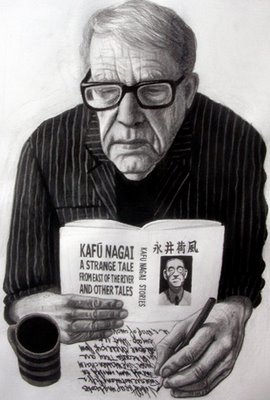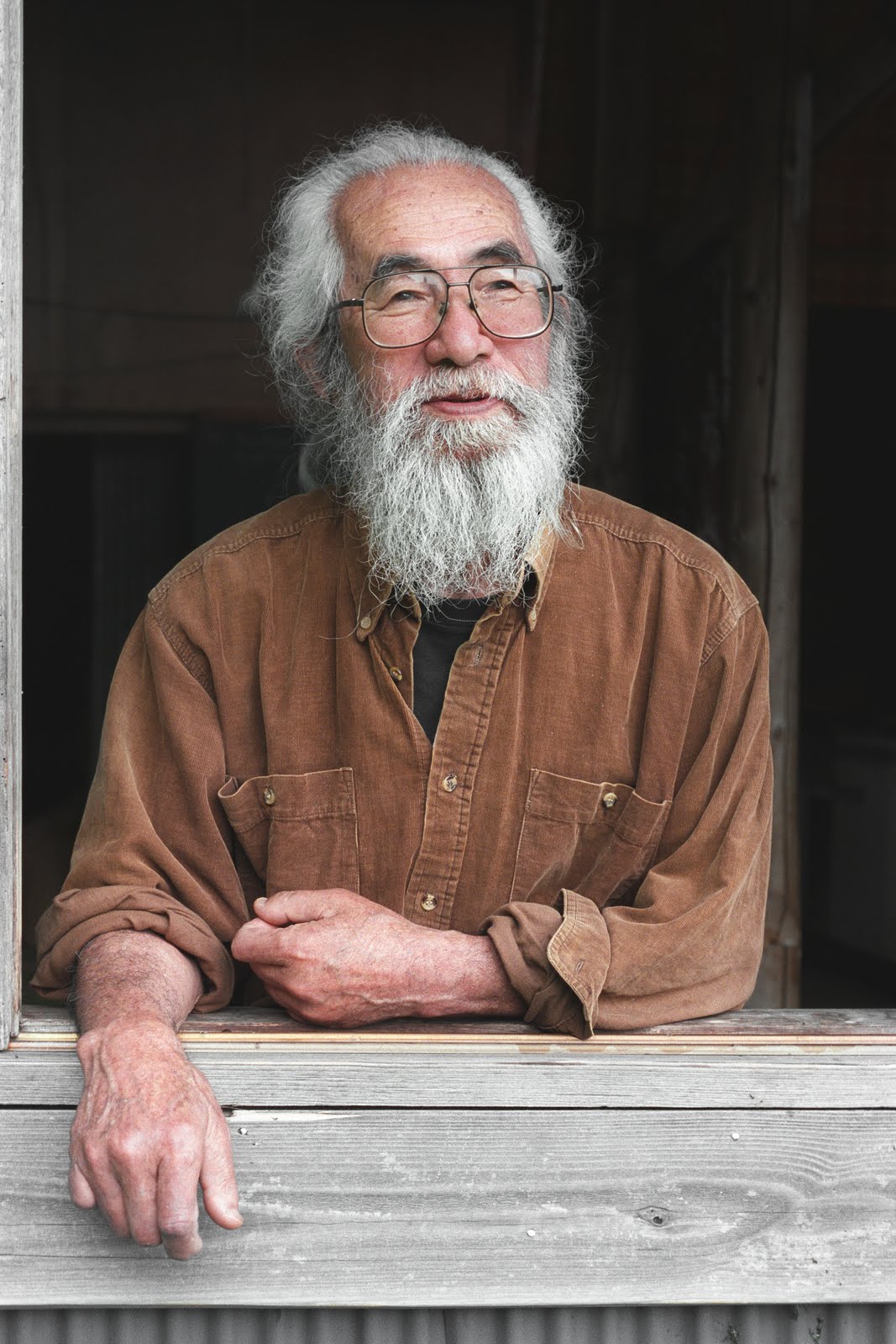Interviews and Encounters with
Buddhist Teachers, Writers, and Leaders
Trevor Carolan
(State University of New York)

- was non-intellectual. It came from farmers - - - so simple. Someone became enlightened, others talked to him, learned and were told, Now go there and teach. When Japan tried to study this, it was hopeless. The emperor sent scholars, but with their high-flown language and ideas, they couldn't understand.
Sakaki was in the Japanese military at Nagasaki when Americans dropped the atomic bomb. Viewing the destruction, he vowed to spend the rest of his life as a wandering poet, beggar and storyteller. One friend said of him that Nanao just reminds us "of that wonderful wise older person we all seem to want, or need, to know."
When his own father was dying, Nanao went to see him. "He was surprised to see me. I said, 'So you are going to become Buddha!' You see, in the Amida sect of my family we say that when you die, you're becoming Buddha."
- His face brightened. He said, "Yes, I'm going to become Buddha, looks like!" So when my friends tell me, "My father is sick, my mother is dying," I say, congratulations! They are becoming Buddha! . . . That's it," he concludes. "When it's time to sleep, just sleep! when you're sick, just be sick; when you're going to die, just die! Enlightenment!"
"It's like hearing good music, really; it calls to me. I start humming, moving - - - I find I'm dancing! That's Zen: not thinking, not stopping halfway, not copying landscape but finally becoming landscape."
 What we find in New World Dharma is that of the sixteen masters Carolan finds to interview, so many are simply charming . . . filled with a mysterious reality imbued with kindness.
What we find in New World Dharma is that of the sixteen masters Carolan finds to interview, so many are simply charming . . . filled with a mysterious reality imbued with kindness. Thich Nhat Hanh tells us that the Self is made up "only of non-Self elements." Carbon and oxygen, protons, neutrons, electrons . . . "If we look deeply into a flower, what do we see? We also see sunshine, a cloud, the earth, minerals, the gardener, the complete cosmos . . . Why?"
- Because the flower is composed of these nonflower elements: that's what we find out. And like this flower, our body, too, is made up of everything else - - - except for one element: a separate self of existence. This is the teaching of non-Self in Buddhism.
"Very often, he says, we forget that 'being' is really inter-being: that living beings are made only of nonliving elements." Genes, chromosomes, DNA, molecules, cells, neurological links, water, salt, trace elements: that's us!
- those who speak don't know
those who know keep silent
those are Lao-tzu's words you say
but if they mean Lao-tzu knew
why did he speak five thousand words
Bill Porter wrote Road to Heaven: Encounters with Chinese Hermits and he did just that, going about in China finding the masters who had chosen the more obscure way, out of the light. His journey and consequent book were funded by a Chinese plastics tycoon, Winston Wong. I was in the land of the Tao that Porter - - - later to be known as Red Cloud - - - discovered what it means. "The Tao says, "You're on the spot. We're not going to tell you anything; you're going to have to discover it." This in contrast to Western spiritual traditions with "some authoritarian figure telling you what's what - - - the monotheistic religions, or a guru or someone. But suddenly here was this Tao that gave me a personal relationship with everything. What a challenge. What an opportunity!"
When he is asked for his favorite Chinese poet he names Tao Yuan-Ming, who spent his ultimate years in a mud-house village. I visited the village where he lived. It was 1,700 years after he lived, and his last male descendent had just died." He liked to hang out with the farmers, "have friends visit, go off and wander in the hills and have a good bottle of wine whenever possible.
- I built my hut beside a path
but hear no cart or horse
you ask how can this be
a distant mind is a far-off place
picking mums by the eastern fence
I lose myself in the southern hills
the mountain air the sunset light
birds flying home together
in this there is a truth
to know but not to say . . .
Someone asks Porter why he is such "an incorrigible sports fan. "I love baseball because nothing happens. Then suddenly it does . . . You can have a conversation at a baseball game. What other sport can you leave for a while, get a beer, come back and nothing has changed?"
One of the surprising things about New World Dharma is that we are reading interviews from years ago so full of insight, a magic insight into the now. Robert Aitken-Roshi speaks meaningfully of realization and understanding, that which is known as "no trace. There's a saying in Japanese monasteries that the Buddha is still doing zazen somewhere; that he is only halfway there! Aitken - Roshi turns out to be prophet of the highest order. This is his interview from twenty years ago, from 1996!
We have a situation not unlike Germany in 1932, of our government in the United States setting up structures that, for the foreseeable future, can only result in a kind of fascistic regime. At this level, inevitable, the poverty in this country will be such that there will be people watching for the "man on the white horse" to come around and take over for them. I think this is almost inevitable. I don't see the political Left or the people who are even more in touch with political and social realities - - - the anarchists - - - having the clout or even the know how and the initiative to stand in the way of this surge . . . I am confident that things are going to get lot worse before they get a lot better, and that the engaged Buddhists, engaged Christians, engaged Jews have to hunker down and consolidate - - - though this may seem like the pessimism of an old man who thinks the world is going to the dogs.
Another prophet is Gary Snyder. He recorded this ten years go, in 2007!
The nature of corporations and globalization is to maximize profit at any cost; they have no concern for the integrity of their own country or its values . . . I was in North Carolina three weeks ago in a town called Hickory where they told me twenty thousand jobs had been lost in the last three years. I asked what kind of jobs these were. They said they were in the furniture industry; it's all gone to China and it's being sold out of Walmart. In many ways, that's what globalization has done. I don't think we should look at that as a positive variety of interconnection. It's not fairly weighted.
And here's Maxine Hong Kingston on running writing workships with and for war veterans: "What I tell them is, "you went to war, to a terrible place and you lived to tell the story; you need to tell us what you learned when you were out there."
There's a sense of urgency; all these things are held in them, and when it just comes out, it's so beautiful because they've been cooking it all these years, decades. It's been working in there. It amazes me how well-written their first drafts are. I can't do that. They can. It often comes out perfect, they don't need to rewrite, and I think it's because they've lived it and they've ruminated and saved it for twenty years. All I need do to is say, 'Here's a piece of paper, a pencil, let it out.'
Not all who appear in this book seem to be enlightened or especially wise. There is an interview with someone named Joanne Kyger who is head, apparently, of name-drop central: Jack Spicer, William Everson, James Broughton, Helen Adams, Lew Welch, Gary Snyder, Claude Gahlenberg and thirty-three others (I just counted). Low on content, fat on rich diet of who-I've-met. Get's the Dalai Lama in there, too.
The book has great moments, but at the end I always found myself coming back to Donald Richie or Red Pine or that cunning cave-dwelling charmer Nanao Sakaki,
Q. You're a skilled amateur botanist and all-around naturalist.
A. No, I just like to know the names of these plants I meet. Same with stars, birds. With some plants I feel like I'm seeing an old friend. Sometimes, same plants even in Alaska and New Mexico. Like kinnikinnick: "Oh, I haven't seen you for so long time!" Same with stars, birds, mammals: always I'm happy to meet bear, caribou, coyote, eagle. It's good feeling.
